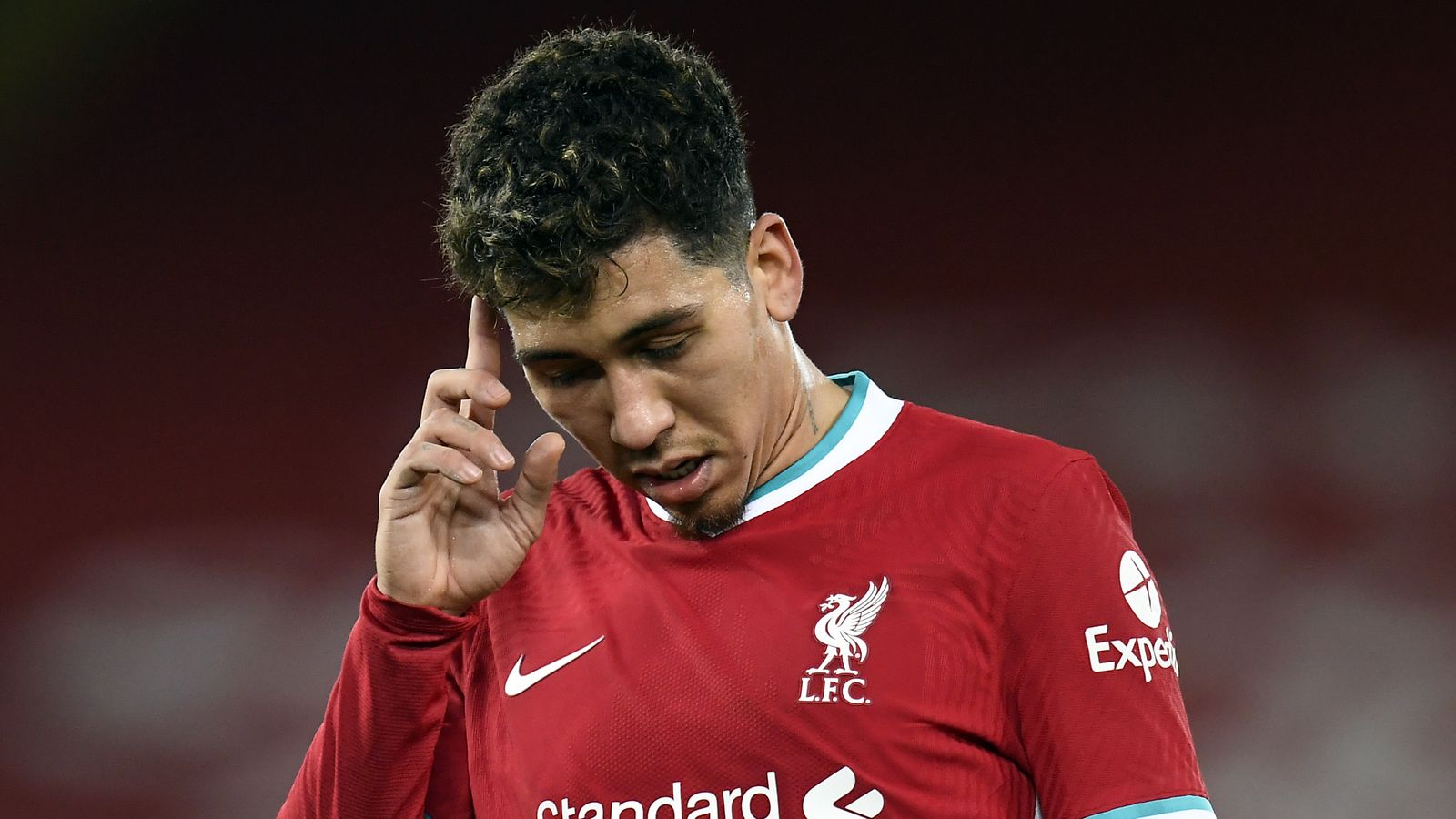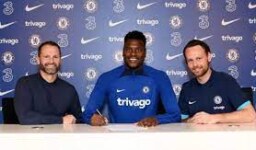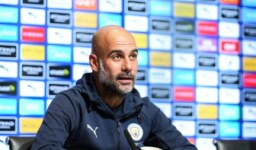
From Liverpool’s goal drought to problems in midfield and defence, we pick out the issues behind the team’s recent struggles, which has seen the defending champions go five Premier League games without a win and slip six points behind leaders Manchester United.
By Peter Smith and Gerard Brand
A successful title defence? The fear after Liverpool’s defeat to Burnley on Thursday night was whether they were now in a battle to even make the top four.
“I cannot remember a time with so many players out of form at the same time,” said Sky Sports pundit Jamie Carragher after Ashley Barnes’ late penalty handed Liverpool their first defeat at Anfield in the Premier League since April 2017, 69 games ago.
It’s now five Premier League matches without a win for the reigning champions and while they are just six points off the top of the table, their tough upcoming run of fixtures look like they could define Liverpool’s season.
They face Manchester United in the FA Cup on Sunday, and then take on Tottenham (a), West Ham (a), Brighton (h), Man City (h), and Leicester (a) in the league.
Then, just a few days after the first leg of Liverpool’s Champions League last-16 tie at Bundesliga title chasers RB Leipzig, there’s a Merseyside derby at Anfield.
“If the next run of games do not go well then I have no doubt they will be well out of the title race by the middle of February, the end of February,” said Carragher. “If that happens then Liverpool will be fighting for their lives to be in the Champions League next season.”
Former Liverpool captain and manager Graeme Souness said: “Jurgen has some hard thinking to do. Some of those players look like they are shot. There is no sparkle about them.”
So what has gone wrong for this Liverpool team which has been so impressive for the past three seasons? We take a look at their problems…
A goal drought and misfiring front three
Sky Sports’ Peter Smith:
Liverpool beat Crystal Palace 7-0 last month. They are the top scorers in the Premier League. But four league games – and 87 shots – without a goal has raised real concerns about the team’s previously formidable attack.
As Jamie Carragher highlighted on Monday Night Football, Liverpool’s reliance on their front three to deliver week-in, week-out, might be becoming a problem – especially with Mohamed Salah and Sadio Mane out of form, and Roberto Firmino experiencing a potentially more concerning dip.
The Brazil forward has had 16 shots during Liverpool’s goal drought and bad misses against Manchester United and Burnley have drawn criticism of his finishing technique.
He has never been as prolific as Salah and Mane – Firmino nearly went the entirety of Liverpool’s title-winning season without scoring at Anfield – but with stats suggesting he is no longer driving the counter-press and winning the ball back in the final third as he has previously to spark attacks, that front-three machine is no longer clicking.
Klopp has bemoaned his attacking players’ decision making and, from dithering when the shot was on to Salah repeatedly trying and failing to dribble past Erik Pieters, a drop-off in confidence and sharpness is now plain to see.
How costly that decision from the manager to play Diogo Jota deep into the dead-rubber against FC Midtjylland is looking now. The injury he picked up in the final minutes of that Champions League game not only deprived Liverpool of their in-form forward but also the option to rest and rotate Salah, Firmino, and Mane.
Divock Origi – who fired a golden one-on-one chance against the bar on Thursday – and Klopp’s other alternatives in attack just do not match up, while this Liverpool midfield has never provided an abundance of goals.
Liverpool’s front three have taken them to extraordinary heights – but they are now struggling badly for the first time.
Alexander-Arnold below his best
Sky Sports’ Peter Smith:
As well as the front three, a defining part of Liverpool’s attack in recent seasons has been the supply from the flying full-backs Trent Alexander-Arnold and Andy Robertson. The pair have 55 assists between them over the past three seasons and only Man City’s Kevin De Bruyne has set up more goals than them in that period.
But at right-back, Alexander-Arnold is struggling to hit the consistent levels he has reached so impressively for much of his young career.
Defensively, he has looked less assured, while, on the front foot, he has just one assist in the Premier League since September. His chance creation rate is down by almost a third.
Against Burnley, Alexander-Arnold sent in 22 crosses – the most he had ever launched in a game – and found a team-mate with just one.
That is a statistic which is not solely down to him – he needs his targets to be alert in the box – but it shows things are not coming together in a department which has been so fruitful for this side.
At left-back, Robertson’s numbers for assists and crossing accuracy are holding up. While Alexander-Arnold has created just three clear-cut openings for his team-mates, Robertson ranks fifth in the Premier League in that metric with eight.
Although he missed two good chances against Man Utd, Robertson remains a reliable performer. But his partner at right-back is below his best.
A patched-up defence has impacted the midfield
Sky Sports’ Gerard Brand:
It goes without saying that losing your player of the year will negatively impact your season. Virgil van Dijk’s injury in October may go down as the key moment in this title race, but the impact has arguably been felt more in midfield than defence.
Fabinho has dropped into the back line with authority – his mistake in the lead-up to Burnley’s goal on Thursday was a rare one – and Liverpool have coped better than many had expected considering additional injuries to Joe Gomez and the recurring absence of Joel Matip.
In fact, they are conceding fewer shots per game this season (8.2) than last (9), and have conceded just 13 goals in 21 games since that ill-fated Merseyside derby.
But there’s little doubt Fabinho’s influence has been missed in midfield. He has not played there since the Everton match, and though Jurgen Klopp has tested young partners in Nat Phillips and Rhys Williams, neither have been given full trust, failing to start consecutive league games.
While the defence has been patched up as well as realistically hoped, the midfield have missed out, having a knock-on impact up the field. Klopp has rotated his midfield three incessantly; Jordan Henderson, Gini Wijnaldum and Curtis Jones has been the most popular three since that draw at Everton, but only on five occasions in the Premier League.
Klopp has tried James Milner, Naby Keita and Takumi Minamino in an attempt to find the intensity they have sorely missed. Thiago’s return from injury gives Klopp another option, but the consistency and pinball-like midfield tenacity that punctuated their title-winning campaign has been missing – their overall duel success is down from 51.5 per cent to 47 per cent.
That lack of bite in midfield was even more keenly felt when captain Henderson was also pulled back into defence alongside Fabinho for the recent games with Southampton and Manchester United.
Matip’s return against Burnley did not prompt the movement of Fabinho into midfield, but that switch may come once the defender settles into match fitness.
More possession, less space?
Sky Sports Gerard Brand:
In almost every post-match interview following an indifferent result, Klopp has referenced the deep-lying defence of the opposition.
It’s nothing new, of course. Big teams have had to deal with low blocks for years, but is the tactic becoming more prevalent throughout the Premier League? And why are Liverpool feeling it more acutely this season?
There is a reason retaining the Premier League is harder than winning it; as champions, Liverpool become the team to beat, or rather, the team you have to stop.
Opposing teams are happier to let Liverpool have possession and sit 10 behind the ball – Liverpool’s average possession is up slightly (65 per cent from 63.5 per cent), but their best performances have come when they have had less of the ball.
The wins over Leicester (56 per cent possession), Wolves (60 per cent), Chelsea (61 per cent) and even Crystal Palace (64 per cent), scoring 16 goals in total, all came in the bottom half of Liverpool’s possessional counts this season. The recent poor form – defeats against Southampton (67 per cent) and Burnley (71 per cent), and draws against Fulham (75 per cent), West Brom (78 per cent) and Newcastle (73 per cent) – all come in the top half.
With less green to run into, Liverpool’s fast breaks have gone down by nearly 50 per cent this season compared to last, and while last season Liverpool topped the league for direct attacks, before the Burnley game they were 12th.
Though Klopp is correct to say teams sit back against Liverpool – and perhaps more this season – it should not come as a surprise. Their problem has been breaking it down.
Missing a little luck… and belief
Sky Sports’ Peter Smith:
“It is not a catastrophe,” said Klopp when asked about Liverpool’s dip in form ahead of the defeat to Burnley and it is important not to go overboard on the criticism. A solitary extra goal in their last four league games would have given Liverpool six more points and kept them top of the table.
As pointed out by Opta’s Duncan Alexander, Liverpool have had an Expected Goals figure of 7.2 across their last five league games and scored just once. They have missed six clear-cut chances in their last four. The overall picture could easily have been different.
Indeed, how would Thursday night’s match have panned out if Origi, clear through one-on-one, had found the top corner rather than rattled the bar?
These fine margins can swing things. They do not detract from some of the deeper problems that are starting to appear but, as Souness said on Sky Sports, some more fortune may have covered the cracks a little longer.
Late goals also played a major part in last season’s title win. Think about the home wins against Leicester, Tottenham, and West Ham, or the victories at Wolves, Aston Villa, Crystal Palace, and Norwich. There was Adam Lallana’s crucial late leveller against Manchester United at Anfield, too.
But, as Carragher highlighted after the defeat to Burnley, that relentless energy at the end of games, that belief and drive required to eventually find a way over the line, is missing right now.
Liverpool scored nine goals in the final 15 minutes of the first 14 games in this season. That late punch has disappeared.
“As the clock ticks closer and closer to 90 minutes the belief goes and you cannot see how Liverpool can score,” he said.
With the Premier League campaign edging into its second half, the clock is ticking on Liverpool’s title defence, too. They need to respond quickly.













